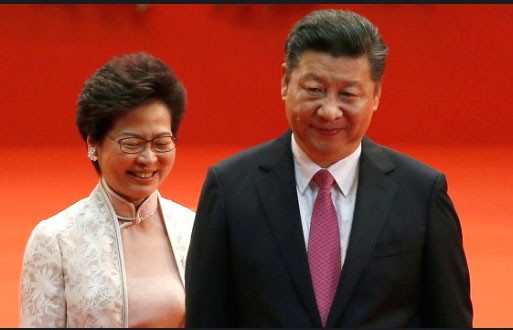by WorldTribune Staff, June 30, 2020
The Chinese Communist Party (CCP) effectively ended free speech in Hong Kong as supreme leader Xi Jinping on Tuesday signed a decree enacting a new “national security” law.

“Drafted and approved in an unusually swift and secretive process, the law empowers Beijing to bring into Hong Kong many of the methods that mainland Chinese agencies use for policing activities that challenge Communist Party rule — a prospect that has sent a chill through pro-democracy groups, businesses, schools and media organizations in the former British colony,” Chun Han Wong and Wenxin Fan wrote for the Wall Street Journal.
The law, which went into affect at midnight on Tuesday, criminalizes secessionist, subversive and terrorist activities in Hong Kong, as well as acts of collusion with foreign forces that endanger national security — all of which can be punished with jail terms. Collusion offenses include espionage and efforts to impose sanctions against Hong Kong or the whole of China, and incite hatred against the local or central government.
The law empowers China’s central government to supervise the policing of so-called “subversive activities” in Hong Kong and, in some cases, intervene directly. Its provisions would supersede Hong Kong legislation should there be inconsistencies between them.
The standing committee of China’s legislature reserved the right to interpret the law, meaning Beijing has the final say over how it is implemented, rather than the city’s courts.
Related: Hong Kong opened its border with China to virus, Peace Prize nominee charges, Feb. 18, 2020
Under the new law, much of the responsibility for enforcing national security falls to a special council formed by Hong Kong officials and led by the city’s chief executive, currently Carrie Lam. The work of the special council will be confidential, with decisions not subject to judicial reviews, the Wall Street Journal report noted.
A special unit within the local police force will handle national-security cases, and it can hire personnel from outside of Hong Kong. Beyond the police’s usual powers in criminal investigations, the law allows the special police unit to put suspects under secret surveillance with authorization from the Hong Kong chief executive.
“The law mandates the chief executive — who is selected by a committee stacked with pro-Beijing members — to designate judges who can preside over national-security cases. Under Hong Kong’s British-style legal system, the judiciary is meant to be independent from government and judges aren’t politically appointed,” Wong and Fan wrote for the Journal.
Hong Kong’s government is also required to strengthen its scrutiny and management of schools, civic organizations, media and the Internet, and use these platforms to educate local residents on matters related to national security.
A dedicated central-government office in Hong Kong will oversee national-security affairs and its personnel are empowered to gather and analyze intelligence, advise and supervise local authorities on security matters. Its personnel won’t be subjected to Hong Kong law when they are carrying out their duties.
Some provisions of the security law were clearly aimed at countering tactics used by pro-democracy activists. Attacks on government facilities can be considered subversion, while damaging public transportation can be regarded as an act of terrorism.
Lam confirmed on Tuesday that the law would go into effect on Tuesday evening.
“Dedicated units in the Hong Kong Police Force and the Department of Justice will be responsible for implementing the relevant legal provisions in the National Security Law,” a statement from Lam read, calling into question their presumed autonomous status. Indeed, Chinese state media reported that Beijing’s selected representatives would enforce the law.
Lam also bizarrely thanked the public for its “overwhelming support” of the law. Millions of Hong Kong residents have taken the streets of to oppose the law and its spiritual predecessor, the extradition law, weeks on end throughout 2019.
Lam also addressed global alarm over the new legislation at a virtual UN Human Rights Council meeting.
“Since last June, Hong Kong has been traumatized by escalating violence fanned by external forces,” she asserted, referring to the largely peaceful pro-democracy protests in the city, many of which were met by violence from pro-China agents.
“During this period, groups advocating ‘Hong Kong independence’ and ‘self-determination’ incited protesters, very often radicalized young people, to desecrate and burn the national flag, vandalize the national emblem and storm the central government’s office in Hong Kong.”
Intelligence Brief __________ Replace The Media
